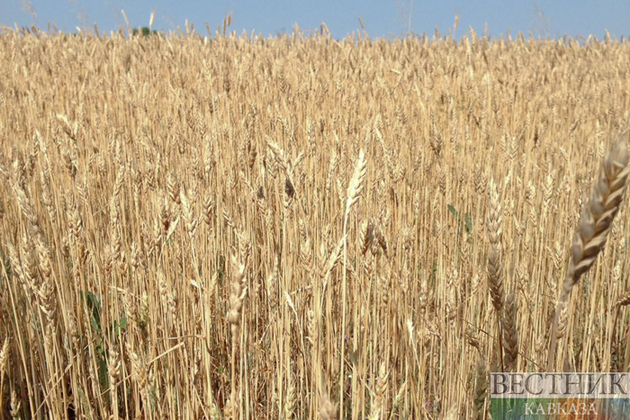Egypt and Russia discussed a partnership between them to establish a logistic free zone in Cairo to store grains, which would greatly contribute to food security in Egypt while also benefiting neighboring countries, Al-Monitor writes.
On Dec. 14, Egyptian Minister of Supply and Internal Trade Ali el-Moselhi met in Cairo with Russian Deputy Agriculture Minister Sergey Levin. Moselhi said they discussed the establishment of an Egyptian-Russian partnership for grain production in Egypt, as well as the establishment of a logistic free zone for wheat storage in Cairo with an initial capacity of 1 million tons per year
In a press statement, Moselhi noted that Russia is a major trading partner for Egypt, and that he discussed with the Russian side the possibility of establishing a partnership for grain trading in Egypt, which would turn it into a nucleus for achieving stability in strategic commodities and ensuring food security for Cairo and neighboring countries, both Arab and African.
He continued that the meeting discussed a partnership to establish storage tanks for edible oils. It was also agreed that a joint committee would follow up on the implementation of the proposals and study them in detail in order to prepare memoranda of understanding and cooperation protocols, as a prelude for their execution on the ground.
Egypt is the world's largest wheat importer. It imported about 12.5 million tons worth $3 billion and 12.9 million tons worth $3.2 billion in 2019 and 2020, respectively, according to data provided by the Central Agency for Public Mobilization and Statistics.
Egypt’s government imports of wheat amounted to 5.5 million tons in 2021, in addition to about 3.5 million tons secured locally from farmers. Russia is one of the largest wheat exporters in the world.
Rashad Abdo, an Egyptian economic expert and president of the Egyptian Forum for Political and Strategic Studies, told Al-Monitor that the Egyptian-Russian partnership in grain trading and wheat storage is a very important step to achieve food security in Egypt and the African continent. “These countries are the largest wheat importing countries in the world. Their food security is all the more threatened currently in light of the coronavirus pandemic and climate changes,” he said.
He praised the Russian-Egyptian talks but stressed the need to expedite the execution of the steps agreed upon. He said, “Both countries and neighboring countries can benefit from this partnership. This will achieve stability of strategic commodities vital for securing food security. In turn, the Russian economy will reap great gains from these steps as this will guarantee it a permanent large sale outlet for its products.”
Abdo stressed the need to expedite the drafting of policies to boost local grain production by encouraging farmers to cultivate large areas and achieve a profit margin. He explained this could allow Egypt to bypass global conditions and climatic changes in the future.
“One of the disadvantages of developing countries is the lack of fixed policies, which makes them vulnerable to changing global conditions, and renders their food security constantly under threat,” he noted.
Adel Amer, director of the Egyptian Center for Political, Economic and Social Studies, believes that the Egyptian-Russian partnership in grain trading and wheat storage is an immense gain for the African continent and a great step to achieve food security and stability. “This partnership is a significant gain for the Russian economy as well. It is a win-win situation,” he told Al-Monitor.
He said that the African continent has always been Egypt's concern, noting, “The Egyptian-Russian partnership will be among Cairo’s priorities to ensure food security for all of Africa, by maintaining the stability of strategic commodities, especially amid the coronavirus pandemic and climate changes.”
He expects practical steps to be taken to activate the partnership between the two countries as of next year, especially in light of their aligned stances and understanding on several issues. “The Egyptian market is an attractive investment factor and a gateway to the large African market,” Amer added. “It is in the interest of the two parties to speed up the activation of the partnership to get the most out of it.”
Yomn al-Hamaki, professor of economics at Ain Shams University and former head of Egypt’s parliamentary economic committee, believes the partnership will be a success in light of Egypt being the largest wheat importer and Russia the largest wheat exporter. “It is in the best interest of both countries as well as neighboring countries to speed up the implementation of this partnership,” she told Al-Monitor.
She praised Egypt’s pivotal role in ensuring food security for the African continent and maintaining the stability of strategic commodities, through its partnership with Russia to establish a logistic free zone for storage of wheat in Cairo. “Being the largest buyer of grain in the world will allow it to persuade Moscow to expedite the activation of the partnership on the ground,” she argued. Hamaki concluded, “The Egyptian market will open the door for Russian products to enter the huge African market. This partnership will not only secure stability for the strategic commodities for Egypt and the other African countries and secure their food security, it will also bolster the Egyptian-Russian influence in Africa."






